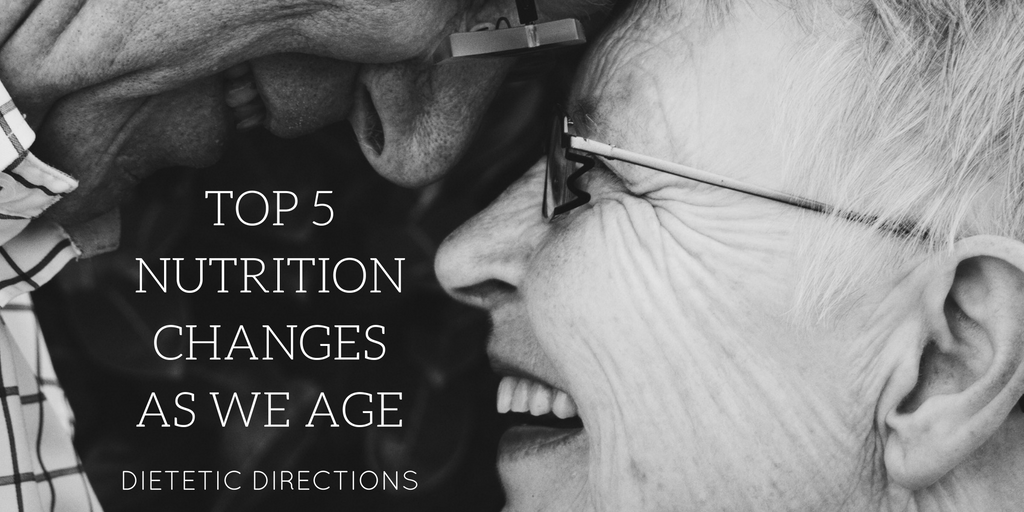
Top Five Nutrition Changes as we Age
It is no surprise that we have an aging population; those over the age of 65 are the fastest growing population group! It is estimated by year 2030, more than one in five will be over the age of 65 (Heath Canada, 2002). As we age, our nutrition needs shift from a focus on growth and development to maintenance, repair and reducing the risk of chronic disease like heart disease, stroke, diabetes, cancer, obesity and arthritis.
Today’s blog will highlight my top five nutritional changes as we age. My follow-up blog will discover my top 10 nutrition tips for an aging population.
-
Decrease in Caloric Needs:
As we age, our bodies require an estimated 20% fewer calories daily. With age, we tend to move less, have decreased muscle mass and we burn fewer calories at rest (lower metabolic rate). Therefore, to maintain our weight, we need to either take in fewer calories through smaller portions or burn more calories through an increase in exercise.
-
Vitamin B12:
After the age of 50, our body’s ability to absorb vitamin B12 decreases with age. Symptoms of B12 deficiency are vague and may include: fatigue, loss appetite, tingling in hands/feet, confusion, depression and poor balance. The true prevalence of B12 deficiency is unknown due to lack of a “gold standard” in screening and sensitive lab measures. Older adults are not typically low in B12 due to dietary intake unless they are vegan or vegetarian diet (restricted animal protein).
-
Vitamin D:
With age, our skin is less able to convert sunlight to vitamin D. Additionally, we tend to spend less time outside. Vitamin D helps our body absorb calcium to maintain bone mass and helps our muscles, nerves and immune system work properly. Low vitamin D status is a risk factor for falls, fractures and osteoporosis.
-
Calcium Needs:
Older adults (and younger adults as well) require calcium to maintain their bone mass and prevent bone loss. Remember that we cannot build bone mass after we are done growing, but we can work to maintain our bone mass! Ensuring adequate calcium intake helps our bones stay strong and decreases the risk of loss of bone mass.
Although bone mass can't be built after growing, adequate calcium intake can maintain it. Click To Tweet-
Stay Hydrated:
As we age, our total body water decreases, as does our ability to detect thirst. The majority of our body water is stored in our lean body mass (muscle); therefore, with a decrease in lean body mass, we also have a reduced amount of body water. Thus, we have a smaller margin of safety for staying hydrated. Adequate hydration reduces stress on kidneys, helps with brain functioning and promotes bowel regularity.
It's important to stay hydrated as we age because we have a smaller margin of safety. Click To TweetBottom Line:
Over the age of 65 our nutritional needs change. There are also different lifestyle changes that also occur during this time that often impacts our eating and nutritional status. If you are caring for an aging parent or grandparent, or aging yourself, emphasize nutrition as the key to healthy aging!



